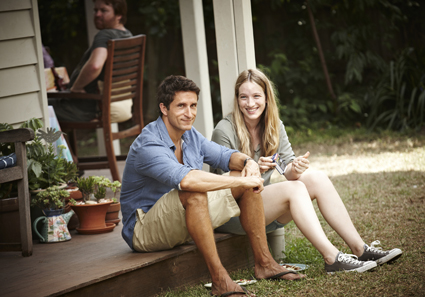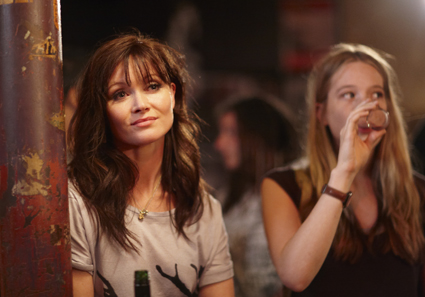spotlight on shame
kirsten krauth: the slap revisited

Jonathan LaPaglia (Hector), Sophie Lowe (Connie), The Slap
IT’S INTERESTING HOW YOU REWRITE A BOOK AFTER YOU HAVE READ IT. AS I WATCHED THE SLAP UNFOLD SLOWLY OVER EIGHT WEEKS ON ABCTV, I BELIEVED CERTAIN THINGS HAD BEEN CHANGED—CHARACTERS SHIFTED ABOUT, EXTRA PLOT POINTS ADDED—BUT WHEN I REVISITED THE BOOK IT WAS MY MEMORY THAT HAD MADE OMISSIONS, HAD CHOSEN CERTAIN BITS TO ELEVATE OR TO FORGET (WHERE IT SUITED ME).
Christos Tsiolkas’ fiction (on which the series is based) has been a stunning success for an Australian novel (and they say Australians don’t read local contemporary literature) and has also sold well in the UK (it was on the long-list for the Man Booker Prize). It’s been critically acclaimed but has also appealed to or enraged the punters, depending on who you talk to. The translation to screen has engaged considerable film and writing talent—Tony Ayres, Brendan Cowell, Robert Connolly, Cate Shortland, Matthew Saville, Emily Ballou— and the series is a bitter-twisted snapshot of Australian culture: where we came from; what we’re doing; where we’re going.
I’ve never had so many arguments about a book/TV show. Everywhere I went— parties, book launches, meetings—people were talking about it. Most hated the characters, seeing them as self-absorbed, selfish, self-loathing, all those ‘self’ words it’s best to avoid, but they were still tuning in. “I can’t relate to them,” said a friend. But I could (oh the shame of it). I knew people like that; perhaps it was better to keep it quiet. And besides, as Charlotte Wood has recently pointed out (in Newswrite magazine), do you really need to relate to characters in order to love a fiction? Tsiolkas has been accused of misogyny because of the way his characters behave. As Tsiolkas retorted, “I think they are confusing the writer with the character. I think there’s a laziness now in how we read [or view]. We read for confirmation of who we are, rather than for a challenge of who we are.’
One of the reasons The Slap has struck a chord is because it’s a highly effective and distilled concept. It’s easy to break down into a synopsis: someone you barely know slaps your kid in the face at a barbie. Is this acceptable behaviour? Discuss. Thrown into the mix are the kid’s parents who offer the boy no boundaries; his mother, Rosie (Melissa George), in a monumental push-me-pull-you struggle, still breastfeeds him at four years. I suspect this may be more offensive to many viewers than the violent Harry (Alex Dimitriades) beating his wife. Why does breastfeeding older children draw such ire? It makes people angry, uncomfortable, deeply suspicious. Is it because the act is suddenly sexualised when the suck is no longer from a baby? Is it because it forces the men at the table to have to look away? While these days many are reluctant to make judgements aloud, parenting is something everyone has strong opinions on and, as a mother, you feel constantly on show. In the end, the series becomes more about the reactions to the slap than the slap itself—about the need to be perceived as doing the right thing, even if you’re falling miserably short.

Essie Davis (Anouk), Sophie Lowe (Connie), The Slap
The TV series does the book justice by taking its time to draw out characters (eight episodes, each focusing on one person), the director-writer teams capturing the essence with mood, dialogue and a changing soundtrack, while the central plots interweave throughout. Tsiolkas may have been accused of misogyny but in the series the episodes focusing on women—such as Anouk (Essie Davis) and Connie (Sophie Lowe)—are particularly strong. Anouk is caught between her desire to write and societal pressures to have children; there’s a sense that she is running out of time. She is always ahead of herself, checking her iPhone when she’s having sex, a woman distracted (just like her mother). Teenaged Connie, maturing quickly without her parents, is caught between a need for stability and wanting to rush at the adult world, swallowing it whole. As she vamps it up in her mother’s dress, longing for grown-up pleasures (jazz, cigarettes, red wine), she is too youthful to know that it is her naturalness, her youth, that Hector truly desires. Both actresses seethe and smoulder on screen. And the Manolis (Lex Marinos) episode is magnificent, the ageing Greek father-figure, so full of pathos as he rages against growing old, weeping for himself at a long lost friend’s funeral, at the constrictions of a lifetime spent under obligation.
The cross-cultural connections, collaborations, conflicts, bring the series to life. The opening episode, where English and Greek fly across the table, where translations are made, lied about or obscured, reveals underlying racial tensions. An Aboriginal man, now a Muslim, refuses alcohol while his wife wears a headscarf; they battle against a wave of distrust. Tolerance exists only on the surface. Tsiolkas is a master of dialogue and it flows effortlessly on screen. We hear snippets of conversation as we would at a party. Secret women’s business shows them huddled, one word enough to dissolve friendships, or to make them laugh, or to suggest sexual conquests. Shared cultural references bring people together: “Adam used to play with himself in front of Play School.” “You can’t blame him, that Jemima’s a sexy minx.”
Tsiolkas is also fond of wankers (perhaps too much so). In his novel The Jesus Man I had to eventually stop reading, before I reached the climax, because I was afraid I might go blind. In The Slap he goes soft on his masturbatory syntax: Connie, Hector, Harry, all experience wankus interruptus—Connie in the fear of the size and shape of things to come; the men constantly frustrated in their desires by the sound of their mothers’ voices, entreating and intruding through the bathroom walls, down the phone lines. It seems there is no escape from a mother’s control.
The series is let down by a couple of weak elements, most notably the laconic voiceover (that has annoyed many critics). William McInnes’ ironic narration jars at every turn, as it intrudes on the characters’ intimate spaces. He has a terrific voice, you know it like the back of your hand, but that’s the problem; it’s not the voice for this series. He pops up in Connie’s bedroom, when she’s reading a letter from her dead father. He’s in Rosie’s bathroom as she faces the mirror. You expect him to jump up from behind the couch and tickle you (like some creepy uncle) at any moment. The voiceover suggests last minute wrangling from producers anxious ‘the viewers won’t get it.’ It shows lack of respect for an intelligent audience, many already familiar with the book. Like the slap itself, it oversteps the mark, a cricket bat to belt us over the heads with. I’d love to see the series again with the narration removed; it would make it a knockout.
Charlotte Woods argues that “Giving life and voice to repellent or taboo feelings and ideas…not only recognises the complexity of human existence, but surely allows the freedom to bring into the light and examine the shameful, repellent parts of ourselves.” The Slap offers large slabs of shame, laid out for all to see, but ultimately it’s the multilayered perspectives, the intergenerational views—on character, on Oz culture, on gender, on race—that make the series exciting contemporary viewing.
RealTime issue #107 Feb-March 2012 pg. 20






